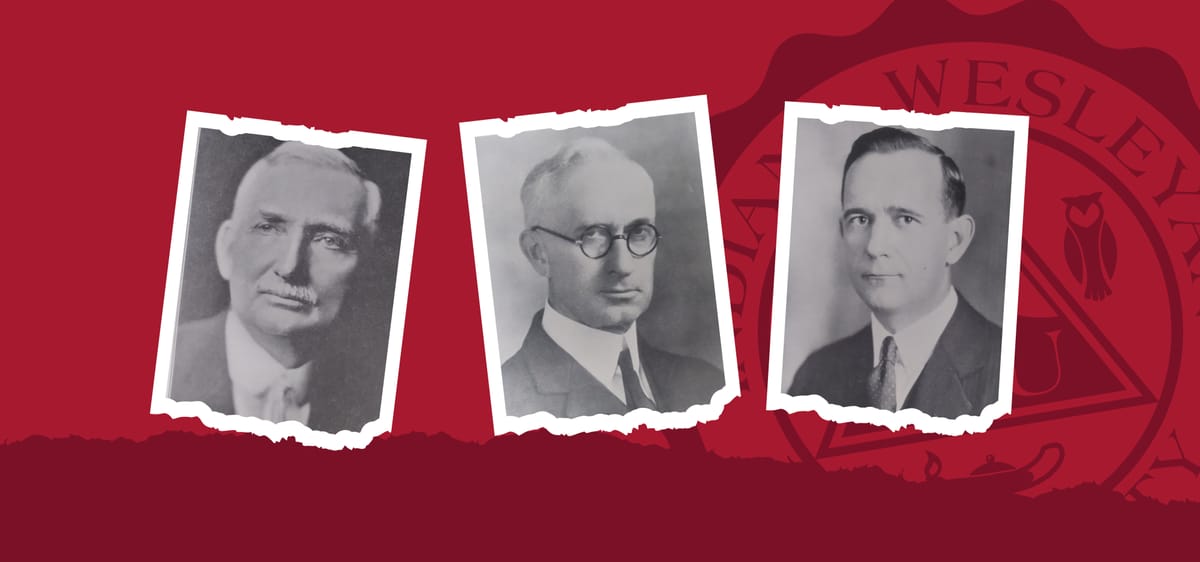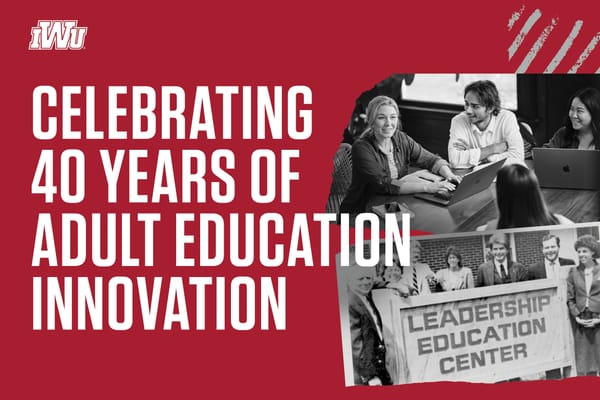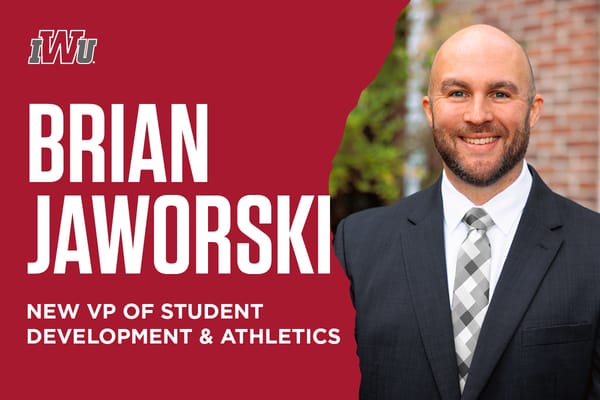Presidents of the Past—The Forgotten Presidents (1927-1932)

A Trio of Acting Presidents
Following the departure of President Leedy, Marion College shifted the role of the presidency for the next five academic years in a way never seen before or since. During the span of these five years, three acting presidents held office, none of whom are included in the official numbering of Indiana Wesleyan University’s presidents, but all of whom contributed to the college’s future in essential ways.
Arras Jones
Following the controversial second presidency of Marion College, right on the heels of the controversial first presidency, the school decided the best choice was to name someone as acting president for the 1927-1928 academic year, thereby giving more time to find a suitable long-term replacement. Of all the people available for the role, there was no better choice than the one they made—Professor Arras Jones. In addition to working at Marion College since its beginning almost a decade prior, Jones boasted a history with the campus extending back decades.
In 1890, the first college to call Marion, Indiana home was established—Marion Normal College. The president of this initial institution was none other than Jones, who was enthusiastic and optimistic about the potential a college in Marion represented for the area. Helping to advertise and promote the school as much as possible, Jones became a well-liked individual in the Marion community due to his desire to bring higher education to the area and clear love of Marion. The chapel talks he gave throughout his presidency were praised as both “interesting and instructive”. By the end of 1892, Marion Normal College completed its best semester and Jones and his staff purchased 563 lots of land to expand the school on both sides of the small campus. An impressive administration building was next constructed on the central triangular section of the campus. This building was completed the following year, and at its dedication the crowd was recorded as so large the school was forced to turn away hundreds of people due to how full the auditorium was. This administration building still stands today, receiving updates throughout the years but remaining as the constant bedrock of the university.
Jones was always involved in Marion, playing a critical role in making Marion Normal College a shining piece of the community. Unfortunately, in October of 1894, Vice President Johnson passed away, dealing a powerful blow to the college. While the 1894-1895 academic year became the most successful so far, by January of 1897, the university found itself in poor condition. Marion Normal College was soon taken over by a new set of leaders, with a businessman named C. W. Boucher purchasing the college as a way of saving the failing university. Boucher brought with him a new administration and renamed the school to Marion Normal College and Business University.
One might expect Jones to leave at this point, the college no longer his and lacking many of the people who begun it with him, but instead he stayed, working as a humble professor at Boucher’s new version of the college. Not long after, The Marion College Journal began, edited by President Boucher and Professor Jones both. Another building was soon erected, the Department of Music, which was located at 38th street, followed by the women’s dorm, Teter Hall, in 1900. The following year, Normal College Football began, and by 1911 the school was well into an era of prosperity. The college was doing so well, in fact, C. W. Boucher and much of the school moved to Muncie the following year, combining with several other groups to form what would become Ball State University.
With Boucher and much of both the staff and the equipment gone, there was immense confusion and uncertainty regarding Marion Normal College’s future and whether it could even continue to exist at all. Once more, Jones stepped in. Helping to get the school back up and running as Marion Normal Institute, Jones stepped into yet another role—serving as the secretary of the university. By 1914, however, the new leadership began to shift again, and Jones was elected president by unanimous vote. This lasted until the spring of 1918, when he once again stepped down at the completion of a four-year term, becoming Dean of the Education Department. While the 1917-1918 school year went well, the advent of World War I created so many hardships for Marion Normal Institute it was forced to close permanently in the summer of 1918.
The following year, the Wesleyan Church purchased the land and buildings and, ever faithful, Jones stayed on as dean. For the first several years of Marion College’s existence, Jones taught psychology and continued as the Dean of Education. He noted, “the school is a fine Christian institution, doing high-grade work.” During these beginning years he also continued as a contributing editor for The Marion College Journal, both helping with the publication as a whole and also writing a regular column of short proverbs.
Through both the Bedford and Leedy administrations, Jones continued on, solid as a rock, before stepping into the role of acting president for the 1927-1928 school year when asked. His slogan for the year was, “Let us make 1928 twice 1927”. Spring Semester of 1928 would prove larger than any other in the school’s history thus far. Over the course of this year, he also reduced the cost of operating the school by several thousand dollars. Many debts were paid off, without reducing the pay of any faculty members or lowering the standards of the school. Former professor and IWU historian Marjorie Elder said of Jones, “[he] was a 72-year-old non-Wesleyan, but no other could have served so patiently.”
After his year as acting president, Jones stepped down from the role, once more serving as a professor of education and as the Dean of the College—both roles he stayed in until his passing in 1933. At the time of his death, Jones left a legacy of over 15,000 students personally taught by him, four decades of service at the campus, had seen several presidents and even colleges come and go, and been president of the campus multiple times, even if he was just an acting president for Marion College itself. After his passing, President McConn established the A. Jones Memorial Library. McConn wrote of Jones, “Every alumnus will mourn with Marion College the passing of Professor A. Jones. The writer of these words will not attempt to eulogize him, for a well lived life needs no eulogy… Always he was inspiring us to work, and his life exemplified the qualities that he urged upon others. Always he was exhorting us to high idealism and lofty thinking. To say that we shall miss him does not express our feelings.”
James S. Luckey
James Seymour Luckey spent many years as a college president, but just one at Marion College. Luckey served as the first president of Marion College’s sister school Houghton College and the father of a later Marion College president. After the conclusion of Jones’ single year as acting president it was decided another acting president was still needed, and so due to Luckey’s proven ability as a Wesleyan college president, he was selected as a safe choice. During the 1928-1929 school year, Luckey served as president of both Houghton College and Marion College, dividing his time between the two institutions, and traveling between them often.
While Luckey’s time was split, he did his best to give as much attention to both colleges as possible. Although he lacked the personal connections to Marion College he enjoyed with Houghton College, he still served well in the role entrusted to him, creating a plan for an advisory board, several new positions which would serve Marion College over the next several years as Luckey shifted people into the best roles for them and brought in a selection of new individuals, and helping to prepare his acting vice president, Henry West, for the role of acting president starting in 1929. At the conclusion of this academic year, Luckey handed responsibility over to West and returned to Houghton College, where he continued to serve with undivided attention until his eventual passing in 1937.
Henry A. West
Henry A. West was the grandson of a Wesleyan abolitionist and a graduate of the Princeton Theological Seminary. In 1915, West married the love of his life, Beth Herington. Together they founded Central Wesleyan College, before moving on to Miltonvale Wesleyan College, and finally Marion College. Henry and Beth were the proud parents of three sons, the youngest of whom suffered from cerebral palsy and required a higher level of attention and care. In the fall of 1927, West took on the role of Professor of Mathematics and Science at Marion College, arriving as a teacher right after Leedy’s departure. For his first year he served as a professor, but during his second, Acting President Luckey took him on as vice president and as his protege. It seems clear Luckey hoped Marion College would find in West the stability it was lacking. The following year, in 1929, Henry West was made acting president. Many years later, one of Henry’s sons, Theodore West, said his father, “was a sensitive, sincere, high-principled man whose success as a teacher led to the recognition that transformed him into an administrator.”
West was soon praised for his personable nature, warm smile, and genuine care towards students as well as respect for everyone he interacted with. It was said of him, “no matter was too trivial to receive his attention, and the person most likely to become discouraged appeared to be his special object of concern.” Like all of his predecessors, West still continued to teach during his presidency, while also attending a variety of conferences and conventions on behalf of the school, serving on local committees, and gardening.
Furthermore, West worked to invest in the future of the university, helping to hire people like Herman Baker and Allen Bowman who would advance the school in different areas for many years to come. West guided Marion College during these formative years in its early history, building a faculty and administrative structure which would solidify Marion College’s devotion to academic excellence while also serving as a role model and strong but caring leader for the college to look toward. Even as the Great Depression began to set in, West worked his hardest to navigate the situation with the school. Speaking of his successor, Luckey said West, “felt a special call to Christian education and he gave himself freely to his calling. God blessed him marvelously in giving him the hearts of the students.”
Tragically, on January 17th, 1932, Henry West passed away at the age of forty-one. Jones was placed in charge of the school for the brief period following West’s passing, prior to the selection of a new president. West struggled in private with poor health for many years, only those closest to him knowing anything was wrong. Even so, he continued to serve Marion College with unwavering commitment until death took him. Left to raise three children by herself, Beth West was thrust into life as a single mother, yet soon tragedy struck once more, when the youngest West son passed away a year-and-a-half later. In one of the last columns he ever wrote for The Marion College Journal, Henry West said, “Only a small portion of our dreams and hopes will ever materialize, perhaps; but the realization of that fact should not deter us from the highest type of endeavor of which we are capable. We shall be judged finally not so much by the amount that we have been able to do as by the quality of our doing and our purpose.”
If he lived, Henry West could no doubt have become Marion College’s official third president and spent many more years enriching the lives of students, staff, and faculty. Sadly, however, this was not to be. For the third time in its short history, Marion College saw the unfortunate end to a presidency, with this being the most devastating blow the office of president would ever suffer at the institution. Although West’s death brought immense grief to the college, casting a suffocating shadow over the remainder of the year and after, God was planning great things for Marion College’s future, ensuring while West was gone, the college he dedicated the last years of his life to would live to see brighter days.
Want to read more? Check out the other articles in the "President's of the Past" series!
- Henry C. Bedford (1919-1922)
- John W. Leedy (1922-1927)
- The Forgotten Presidents (1927-1932)
- William F. McConn (1932-1960)
- Woodrow I. Goodman (1960-1976)
- Robert R. Luckey (1976-1984, 1986-1987)
- James P. Hill Jr. (1984-1986)
- James B. Barnes (1987-2006)
- Henry L. Smith (2006-2013)
- David W. Wright (2013-2022)





